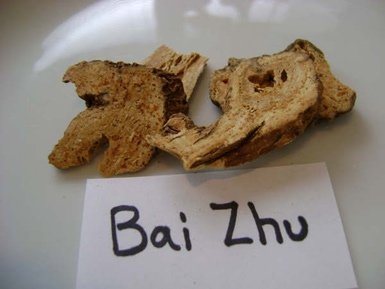Energy for Life with Bái Zhù – The Wonder of the South
When it comes to restoring the vital energy or, as a Traditional Chinese Medicine specialist would say, invigorating the Qi, the title of “the first herb” is held by Atractylodes macrocephala Koidz, known as Bái Zhù in China, Bach truat in Vietnam and large-headed atractylodes in the West.

Bái Zhù is a perennial herb cultivated mostly in China, Vietnam, Korea and Japan for the medicinal uses of its rhizomes. The rhizome is fleshy, but sticky when chewed, it has a delicate fragrance and a sweet but pungent taste. It is used in many formulas that aim to tonify spleen and benefit vital energy and it is in fact so powerful that in Traditional Chinese Medicine it is treated as an equal of Rén Shēn (ginseng). Thus an old saying goes: “Rén Shēn in the north and Bái Zhù in the south.”
Contents
Traditional Chinese Medicine
In Traditional Chinese Medicine, Bái Zhù is bitter, sweet and warm and influences the channels of Spleen and Stomach. Being warm, its main function is eliminating the dampness and thus relieving its different pathologic manifestations: stagnant water in the stomach (and subsequent abdominal dilatation), watery diarrhea, edema, night sweats, spontaneous sweating, vomiting in pregnancy, dizziness and palpitation (caused by phlegm and retained fluid).
In Vietnam
In Vietnam, the rhizome is used in treating various digestive diseases for its peptic, antiulcer, anti-inflammatory and cholagogic activity. It is used in the treatment of gastritis, peptic ulcer, hepatic hypofunction, dyspepsia, vomiting, lientery (the passage of undigested or partially digested food in the stool), chronic enteritis, colic in pregnant women and diaphoretic fever. It is also prescribed as a diuretic, antitussive and hypoglycaemic remedy, useful for the treatment of edema and diabetes mellitus.
Modern researches
New modern researches show that besides adjusting gastrointestinal motility, fighting ulcer, protecting liver, regulating blood sugar level and inducing diuresis, Bái Zhù can also relieve stress, improve the function of the immune system, enhance the hematopoietic function, fight oxidation, slow down aging and fight cancer. And in an article published in February 2014 in Journal of Ethnopharmacology it is further concluded that “the results [of the study] suggest the potential usefulness of Atractylodes macrocephala Koidz to cure intestinal disorders characterized by injury and ineffective repair of the intestinal mucosa”. So it seems that the Chinese were right: This is indeed an amazing herb!
How to use it
Bái Zhù is available either as extract granules at 5x concentration or simply as dried herb. The daily dose is 6 to 12 g dried herb (as powder or in a decoction) or approximately 1.5 g extract granules. Some say that it should be stir-baked if you want to use it mostly for invigorating Qi and strengthening the spleen, and consumed unprepared if you want to make use of its capacity to remove dampness and induce diuresis.
Bái Zhù should be avoided by those suffering from dryness and thirst due to Yin defficiency and also by those suffering from stomach bloating and abdominal distension caused by stagnation of the vital energy (in this case, the Qi is already quite invigorated, but its circulation is blocked and therefore Bái Zhù will only worsen the symptoms).




Thank you ! Thank you !
🙏